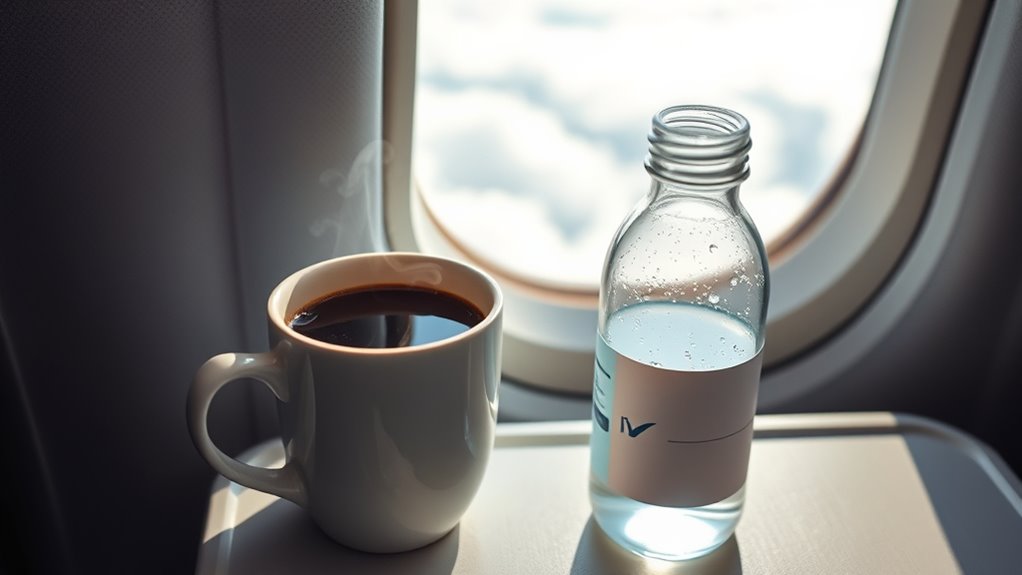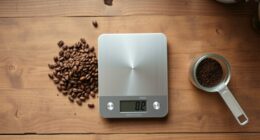When flying, caffeine can boost your alertness but may also lead to dehydration because it’s a diuretic. To stay hydrated, limit caffeine intake to 1-2 cups and balance it with plenty of water. Avoid excessive coffee or tea, which can increase fluid loss and cause fatigue. Managing your caffeine consumption along with proper hydration helps you stay comfortable and energized during your trip—keep going to discover more tips for a smoother flight experience.
Key Takeaways
- Caffeine acts as a diuretic, increasing fluid loss and potentially worsening dehydration during flights.
- Limiting caffeine intake to 1-2 cups helps maintain hydration levels while staying alert.
- Drinking water regularly is more effective for hydration than relying on caffeinated beverages.
- Combining moderate caffeine with water and hydrating foods supports alertness without dehydration.
- Excessive caffeine can cause restlessness and further fluid depletion, so moderation is key during air travel.

Traveling by air can quickly dehydrate your body, especially since airplane cabins have low humidity levels. As a result, staying properly hydrated becomes essential to avoid fatigue, headaches, and other discomforts. Caffeine, often consumed to stay alert during long flights, can complicate this hydration challenge. While a cup of coffee or tea might seem like a good way to combat drowsiness, caffeine is a diuretic, meaning it encourages your body to eliminate fluid. This can worsen dehydration, making your journey even more exhausting. To counteract this, it’s indispensable to balance your caffeine intake with plenty of water. Drinking water not only helps hydrate but also supports your body’s natural ability to flush out toxins and maintain energy levels.
Stay hydrated during flights; balance caffeine intake with plenty of water to prevent dehydration and fatigue.
When considering jet lag remedies, hydration plays a pivotal role. Dehydration can intensify jet lag symptoms like fatigue and disorientation. To help your body adjust more smoothly to new time zones, focus on in-flight nutrition that prioritizes hydration. Opt for water-rich foods like fruits and vegetables—think oranges, strawberries, or cucumber slices—if available. These can supplement your fluid intake and provide essential nutrients that keep you energized. Avoid salty snacks and processed foods, which can increase thirst and promote fluid loss. Instead, choose light, nutritious options to support your body’s recovery and adaptation process.
In addition to managing caffeine and hydration, paying attention to your overall in-flight nutrition can make a significant difference. Consuming balanced meals with lean proteins, healthy fats, and complex carbs sustains your energy without causing blood sugar crashes. Pack snacks like nuts, seeds, or granola bars that are nutrient-dense and easy to carry. These help maintain your blood sugar levels, reducing fatigue and irritability. Remember, staying hydrated isn’t just about drinking water; it’s about maintaining a steady intake throughout your flight. Sip regularly rather than gulping large amounts at once, which can be uncomfortable and less effective.
Finally, be mindful of your caffeine consumption throughout the journey. While moderate caffeine can help you stay awake and alert, overdoing it can lead to dehydration and increased restlessness. Limit yourself to one or two cups per flight, and balance that with plenty of water. Additionally, choosing self watering plant pots for your home or office helps ensure your plants stay healthy with minimal effort, much like maintaining proper hydration during travel. By combining mindful caffeine intake, proper hydration, and nutritious in-flight nutrition, you can make your air travel experience more comfortable and less taxing on your body. This approach will help you arrive feeling more refreshed and ready to tackle your destination, despite the challenges of jet lag and the dehydrating effects of flying.
Frequently Asked Questions
Does Caffeine Affect Sleep Quality During or After Flights?
Yes, caffeine can affect your sleep quality during or after flights. It may cause sleep disruption by making it harder to fall asleep or stay asleep, especially if consumed later in the day. While caffeine helps maintain alertness during your flight, it can interfere with your ability to rest afterward. To minimize sleep issues, limit caffeine intake close to your intended sleep time and prioritize relaxation to improve sleep quality post-flight.
Are There Specific Types of Caffeine That Dehydrate More Than Others?
Yes, some types of coffee and energy drink varieties can dehydrate you more. For instance, darker roasts of coffee tend to have slightly more caffeine, which can increase dehydration risk. Similarly, certain energy drinks contain higher caffeine levels and added sugars that can pull more water from your system. Opt for lighter coffee or lower-caffeine energy drink options to minimize dehydration and stay better hydrated during your flight.
How Does Caffeine Impact Jet Lag Recovery?
You might find caffeine acts like a helpful guide during jet lag recovery, temporarily boosting alertness and easing fatigue. It influences caffeine metabolism, which can slightly delay sleep and circadian rhythm adjustment. However, overdoing it could interfere with your sleep cycle, so moderate intake helps. By timing your caffeine wisely, you support your body’s natural rhythm, making jet lag less disruptive and helping you settle into the new time zone more smoothly.
Can Caffeine Intake Influence Blood Circulation at High Altitudes?
Yes, caffeine intake can influence blood circulation at high altitudes. It causes vessel constriction, which reduces blood flow, making your circulation less efficient. This can lead to increased heart rate and higher blood pressure, stressing your cardiovascular system. If you’re flying at high altitudes, moderating caffeine consumption helps maintain better blood flow and prevents unnecessary strain on your vessels. Always listen to your body and consult a healthcare professional if needed.
Is Caffeine Consumption Linked to Increased Risk of Deep Vein Thrombosis?
Caffeine consumption is like adding fuel to a fire, potentially raising your risk of blood clots, including deep vein thrombosis. While moderate caffeine intake doesn’t directly cause blood clots, excessive consumption can lead to dehydration and increased blood viscosity, which may contribute to clot formation. So, if you’re flying long distances, it’s wise to limit caffeine to help reduce your risk of developing blood clots.
Conclusion
Remember, during your flight, balancing caffeine intake and hydration keeps you feeling your best—think of it like tending to your trusty steed on a long journey. Avoid overdoing the coffee to prevent dehydration, and sip water regularly, just as a good knight would guard their health. So, stay savvy, and don’t let your adventure turn into a medieval saga of fatigue. Keep it simple, stay hydrated, and enjoy your flight like a true modern traveler.










